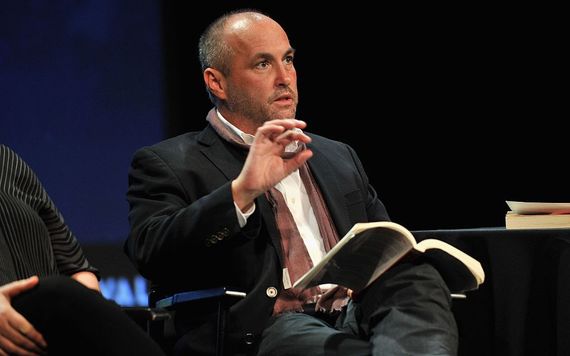An extract from "The Writing Irish of New York," a collection of essays featuring work by Colum McCann, Billy Collins, Luanne Rice, Malachy McCourt, and many more.
Many aspiring writers have uprooted themselves for a move to New York in the hope of finding their voice and the Irish are no different. From Frank McCourt to Brendan Behan to Colum McCann, some of our finest have walked these streets, allowing the sights and sounds to add to their work and forming their identities in the City that Never Sleeps.
In the new book "The Writing Irish of New York," editor Colin Boderick explores these characters, their Irishness and their connection with the city in a collection of personal essays composed by the likes of Colum McCann and Malachy McCourt.
Read more: How Brendan Behan came to join the writing Irish of New York
#TheWritingIrishofNewYork launched tonight with hilarious & poignant readings from Maura Mulligan, Malachy McCourt, Honor Molloy, music from The Ryan Brothers, & a call-to-action conversation btw Peter Quinn & editor @colin_broderick. @lavenderink. Published by @lavender_ink_pr. pic.twitter.com/m08CT3Nn76
— Irish Arts Center (@IrishArtsCenter) December 7, 2018
"Perhaps what I am trying to do with this book is exactly what I’ve been trying to do with everything else that I write. I’m trying to figure out who I am and what my place in the world is," writes Broderick in his introductory essay.
"Identity is a funny thing. We are always looking for ways to identify ourselves, we identify ourselves by sex, skin color, language, by country of origin. We do it almost without thinking. It’s how we’re wired. We cling to identity because the story we create about ourselves solidifies the notion of who we believe we are in the world. And that story gives us comfort.
"It certainly gives me comfort to think I know who I am and the act of writing has always helped me etch out a narrative about myself that I can rely upon. Writing helps me wipe the mirror clean so I can say, 'Ah, there you are.'"
In the extract below, "TransAtlantic" author Colum McCann writes on the ways in which New York entices Irish writers to live there.
You can read the essay in full and many more in "The Writing Irish of New York," edited by Colin Broderick, available to purchase at Broderick's website here. It is also available on Amazon or at Barnes & Noble.
THE NEW YORK BOOK OF THE DEAD by Colum McCann

Colum McCann. Image: Getty/Bryan Bedder.
In the mid-1980s I lived in rural Texas. I was a wilderness counselor in a camp for juvenile delinquents. Six teenagers and I lived in pine-pole shelters in an out-of-the-way creekbed. The purpose was to give them time to confront their lives, their problems, their demons. They would emerge after three months and then move to an on-campus school.
The days were stacked with things to do. We built an outdoor latrine and gravity-fed showers. We grew a small garden. We occasionally took trips, rock climbing and kayaking. We slept out every night. The stars were like bullet holes above us. The mornings broke hard and hot. We worked all day, exhausted ourselves. I became an inhabitant of what it meant to be on the edge of wild.
The boys had all been through tough lives. Most of them had spent time in juvenile detention. In their family lives, they had seen despair. But at night I would read them to sleep. “The Grapes of Wrath.” “Catcher in the Rye.” A fable called “Fup” by Jim Dodge. They had never been read to before, but amazingly they fell asleep to the stories. I was already consumed by literature and I was moved by the power it had over these kids who had seen more despair and violence than my imagination might ever offer.
I was in my early 20s and wanted to be a writer. Much as I liked the wilderness camp, I was sure that I had to get away. I would lie back on my pine-pole bed and dream of going to New York. I’d wear a dark overcoat and a black beret and affect for myself a Kerouac way of walking.
The dream of most of us is the dream of being elsewhere. New York seemed to hold elsewhere like no other place. I had already spent a few months there when I was eighteen years old, fresh from Ireland, but I wanted to return. To slip into the pattern of the writing life. Enough of all these gravity-fed showers. No more tree branches. No more cricket song. I needed to get away from Texas.
At night, in the camp, after the boys were asleep, I would slip away from the creekbed, to go smoke a cigarette which was, I suppose, as close to literary cliché as I could get. The boys, of course, were not allowed smoke, and I didn’t want to set a bad example. So I drifted along the creek bed, over a few fences and lay in a nearby grass field, blowing smoke rings at the dark and dreaming my writerly life, wandering through the Village on the arms of beautiful women, bringing a brigade of drunks to the White Horse Tavern, reading aloud at the Bowery Club.
Later I strolled back through the klein grass towards the camp where I checked the tree houses to make sure all the boys were asleep (occasionally they would run away but they inevitably returned because they were “afraid of the dark”). I hid my cigarettes and drifted off to sleep. My imagination turned the corner onto Saint Marks Place. I joined the little riot of language down there by Tompkins Square Park, turned towards the Bowery once more.
~~ ~ ~~~~~~~~~~~~~~~~~~~~~~~~~~~~~~~~~~~~~~~~~~~~~~~~~~~~~~
I lived in New York for a summer when I was a teenager. At that age, naivety can overcome reality—when I first came to the city I didn’t even mind the cockroaches that littered the floor of the tiny room I rented in Brighton Beach for $120 a month.
I worked in Manhattan, a runner for a press syndicate, dropping off envelopes and getting sandwiches for the bosses. I came home every night on the D-train, heroic with beer and cocaine and youth. I was either too stupid or too broke to get mugged.
I recall standing transfixed in the middle of the pavement one night, people stepping blithely around me as I stared up at Time-Life building, watching the lights flicker on and off in the upper floors, thinking if there was nothing else in my life there would always, at least, be this. A gorgeous rubbish heap of a city.
Eventually, I worked my way through the ranks and began reporting, but after a few months, I returned to Ireland again.
I still had the Broadway glare in my eyes, but it was almost eight years, the early 90s before I got a chance to live in New York again.
You can read the essay in full and many more in "The Writing Irish of New York," edited by Colin Broderick, available to purchase at Broderick's website here. It is also available on Amazon or at Barnes & Noble.




Comments